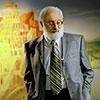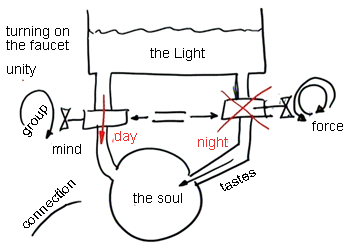 Like A Bundle of Reeds, Why Unity and Mutual Guarantee Are Today’s Call of the Hour, Michael Laitman, Ph.D.
Like A Bundle of Reeds, Why Unity and Mutual Guarantee Are Today’s Call of the Hour, Michael Laitman, Ph.D.
Chapter 9: Plurally Speaking
Affecting Social Cohesion Through the Social Environment
Recall the First “Ego-Warrior”
When the speaking level of desires first erupted as egotism, Babylon was at its peak, and Abraham was the one faced with trying to solve the mystery of his people’s social decline. His countryfolk were so immersed in building their tower that they completely abandoned their camaraderie. They were no longer “of one language and of one speech” (Genesis 11:1); all they cared about was the tower.
The book, Pirkey de-Rabbi Eliezer (Chapters of Rabbi Eliezer), portrays Abraham’s dismay with his people’s new passion: “Rabbi Pinhas says that there were no stones there [in Babylon] to build the city and the tower. What did they do? They fashioned bricks and burned them like artisans until they built it [the tower] seven miles high. Those who would lift up the bricks climbed up from the east, and those who climbed down would descend on the west. And if a man fell and died they would pay him no mind. But if a brick fell, they would sit down and wail saying, ‘When will another come up in its stead?’ When Abraham, son of Terah, walked by and saw them building the city and the tower, he cursed them in the name of God.”[i]
But Abraham did more than curse the builders. First, he tried to mend the rift and bring his people back together. Midrash Rabah tells us that Abraham brought together all the people in the world,[ii] and Rabbi Behayei Ben Asher tells us how he exposed Nimrod’s pretence of supernal powers. In his Midrash, Rabeinu [our Rav] Behayei, he writes, “[Nimrod] said to him, ‘I created the earth and the heaven with my power.’ Abraham replied, ‘…when I came out of the cave, I saw the sun rising in the East and setting in the West. Make it rise in the West and set in the East, and I will bow unto you. But if not, the one who gave my hand the strength to burn the statues will give me strength and I will kill you.’ Nimrod said to his counselors, ‘What shall be the sentence of this one?’ They replied, ‘He is the one of whom we said, ‘A nation shall come forth from him and inherit this world and the next world.’ And now, as the sentence he had decreed, so shall be done unto him. Promptly, they threw him into the furnace. At that time the Lord filled with mercy over him and saved him, as it is written, ‘I am the Lord, who brought you out of Ur of the Chaldeans.’”[iii]
Following his heated debate with the king, Abraham took his family, his students, and his possessions and fled from Babylon. Along the way he collected into his entourage people who agreed with his message—“When faced with egotism, unite above it.” In other words, when hatred breaks out among friends, make the common goal of revealing the Creator—the quality of bestowal, the fundamental force that creates reality—more important than the rivaling parties, and thus unite above the rivalry. The bonuses of such deeds are enhanced unity, subsequent acquisition of the quality of bestowal by the former adversaries, and consequently, the revelation of the Creator.
The above sentence describes the essence of the fusion, the mending of the rift with which Abraham attempted to furnish his countryfolk. And that essence—unity above differences enhances cohesion and (if you want it to) reveals the Creator—has never changed. In fact, it will never change, as it is Nature’s Law of Bestowal.
As detailed in the Introduction to this book, Abraham’s group succeeded in uniting and grew into what became the people of Israel, a nation whose common trait is the desire for the Creator. Through unity above differences, as explained in Chapter 1, Israel developed a method by which to shift one’s thinking from the “me” mode to the “we” mode, thus perceiving the “One,” the Creator.
Thus, while Israel was going from strength to strength by employing unity over egotism, the rest of the world was experiencing episodes of ebb and flow, with empires rising and falling and the hedonistic culture of self-indulgence assuming predominance. For this reason, even today, in the most hedonistic of all eras, Abraham’s monotheism is the predominant notion of deity, while the Tower of Babylon is a symbol of human conceit and folly.
This is why the only ones who can educate the world as to the way one can grow as wise as Abraham are those who were his students, the children of Israel, known worldwide as Jews. This wisdom was Abraham’s legacy to them, and passing it on as he did is their obligation to the world.
[i] Pirkey de-Rabbi Eliezer (Chapters of Rabbi Eliezer), Chapter 24.
[ii] Midrash Rabah, Beresheet [Genesis], Parasha 39, Paragraph no. 3.
[iii] Rabbi Behayei Ben Asher Iben Haluah, Rabeinu [our Rav] Behayei, Beresheet [Genesis] 15:6.
Filed under: Anti-Semitism, Books - No Comments →
 In the News (from Psychologies.ru): “Why do people in power clearly display tyranny, obstinacy and mental instability? The answer is simple: a slight feeling of superiority over others might have a significant impact on all of us.
In the News (from Psychologies.ru): “Why do people in power clearly display tyranny, obstinacy and mental instability? The answer is simple: a slight feeling of superiority over others might have a significant impact on all of us.











